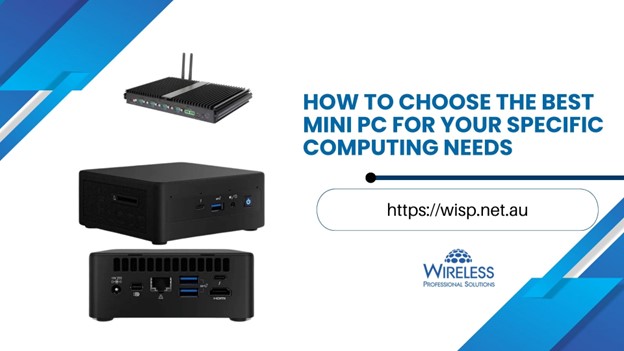Mini PCs have gained immense popularity due to their compact size, energy efficiency, and versatile functionality. Whether you're looking for a compact solution for home entertainment, a powerful workstation for your office, or an efficient device for a small business, Mini PCs can meet a wide range of computing needs. However, with so many options available, choosing the right Mini PC can be overwhelming.
This guide will help you understand the key factors to consider when selecting the perfect Mini PC for your specific requirements.

1. Determine Your Primary Use Case
The first step in choosing a Mini PC is to clearly define what you intend to use it for. Mini PCs vary widely in performance, price, and functionality, so knowing your primary use will help narrow down your options.
Here are some common use cases for Mini PCs:
- Home Entertainment and Streaming: If you're looking for a Mini PC to stream movies, browse the web, or use as a media center, you don't need a powerhouse. A basic Mini PC with moderate specifications will suffice.
- Office Work and Productivity: For general office tasks like word processing, spreadsheets, and video conferencing, a Mini PC with a mid-range processor, 8GB of RAM, and an SSD for storage should be sufficient.
- Gaming: For gaming, you'll need a more powerful Mini PC with a dedicated GPU, fast processors, and at least 16GB of RAM to handle the latest games.
- Content Creation and Editing: If your tasks include video editing, graphic design, or other resource-intensive activities, opt for a high-performance Mini PC with a multi-core processor, dedicated graphics, and ample RAM.
Understanding your specific needs will guide you toward the right specs and features, preventing you from overspending or buying an underpowered device.
2. Pay Attention to Processor (CPU) Performance
The processor, or CPU, is the heart of any computer and plays a major role in determining performance. Mini PCs come with a variety of processors, from basic chips to high-performance models.
Here are the most common CPU types found in Mini PCs:
- Intel Celeron or Atom: Suitable for basic tasks like web browsing, word processing, and streaming media.
- Intel Core i3/i5/i7 or AMD Ryzen: These processors offer a good balance of performance and energy efficiency, making them ideal for office work, multitasking, and light to moderate gaming.
- Intel Core i9 or AMD Ryzen 7/9: High-end processors for professional work such as 3D rendering, video editing, or intensive gaming.
If you're unsure, a good middle ground for general users is an Intel Core i5 or AMD Ryzen 5, as these provide strong performance without going overboard on cost.
3. Evaluate Memory (RAM) Requirements
RAM, or random access memory, determines how efficiently your Mini PC can handle multitasking and run memory-intensive applications. The more RAM you have, the better your Mini PC will perform under load.
- 4GB RAM: Suitable for light computing tasks, like browsing the web or streaming content.
- 8GB RAM: Ideal for most office tasks and moderate multitasking.
- 16GB RAM or more: Required for heavy multitasking, gaming, video editing, and professional software use.
For a future-proof option, 8GB is generally considered the minimum for modern computing, while 16GB is ideal for more advanced tasks.
4. Storage Options: HDD vs. SSD
When selecting a Mini PC, pay close attention to the storage type and capacity:
- HDD (Hard Disk Drive): While HDDs offer larger storage capacities at lower prices, they are slower and more prone to mechanical failure compared to SSDs.
- SSD (Solid State Drive): SSDs provide much faster data access and boot times, which significantly improves overall system performance. Opt for an SSD, even if it's smaller, as you can always add external storage later.
For most users, a 256GB or 512GB SSD is a great starting point. If you're handling large files regularly (such as videos or high-res images), consider models that offer 1TB or higher storage options.
5. Look for Connectivity and Port Options
Mini PCs come with a range of ports that allow you to connect peripherals, external drives, and other devices. Depending on your usage, you'll need to ensure the Mini PC has the necessary ports:
- USB ports: Ensure there are enough USB ports (USB 3.0 or USB-C) for your keyboard, mouse, printer, and other devices.
- HDMI or DisplayPort: If you plan to connect your Mini PC to a monitor or TV, you'll need an HDMI or DisplayPort connection.
- Ethernet and Wi-Fi: While most Mini PCs come with Wi-Fi, having a Gigabit Ethernet port can ensure a more stable and faster internet connection, especially for streaming or gaming.
- Bluetooth: This feature allows you to connect wireless peripherals like headphones, keyboards, or mice.
Make sure the Mini PC has all the connectivity options you need for a smooth experience.
6. Size and Cooling System
One of the major benefits of a Mini PC is its compact form factor. However, smaller devices may have limitations in terms of heat management and performance. High-performance Mini PCs, especially those used for gaming or heavy multitasking, may require active cooling systems, while fanless models are silent but best suited for less intensive tasks.
Choose a Mini PC that balances size with your required performance level. If portability is key, a fanless, ultra-compact model might be the best choice.
Selecting the right Mini PC comes down to understanding your specific needs and balancing performance with budget. Whether you're looking for a basic device for media consumption or a powerhouse for professional work, today's Mini PCs offer a range of powerful, compact, and energy-efficient options to suit any computing requirement.
By focusing on the processor, memory, storage, and connectivity features that match your tasks, you can confidently choose the perfect Mini PC for your needs. Explore the wide selection of Mini PCs available on Wireless Professional Solutions to find the ideal fit for your workspace or home setup.
